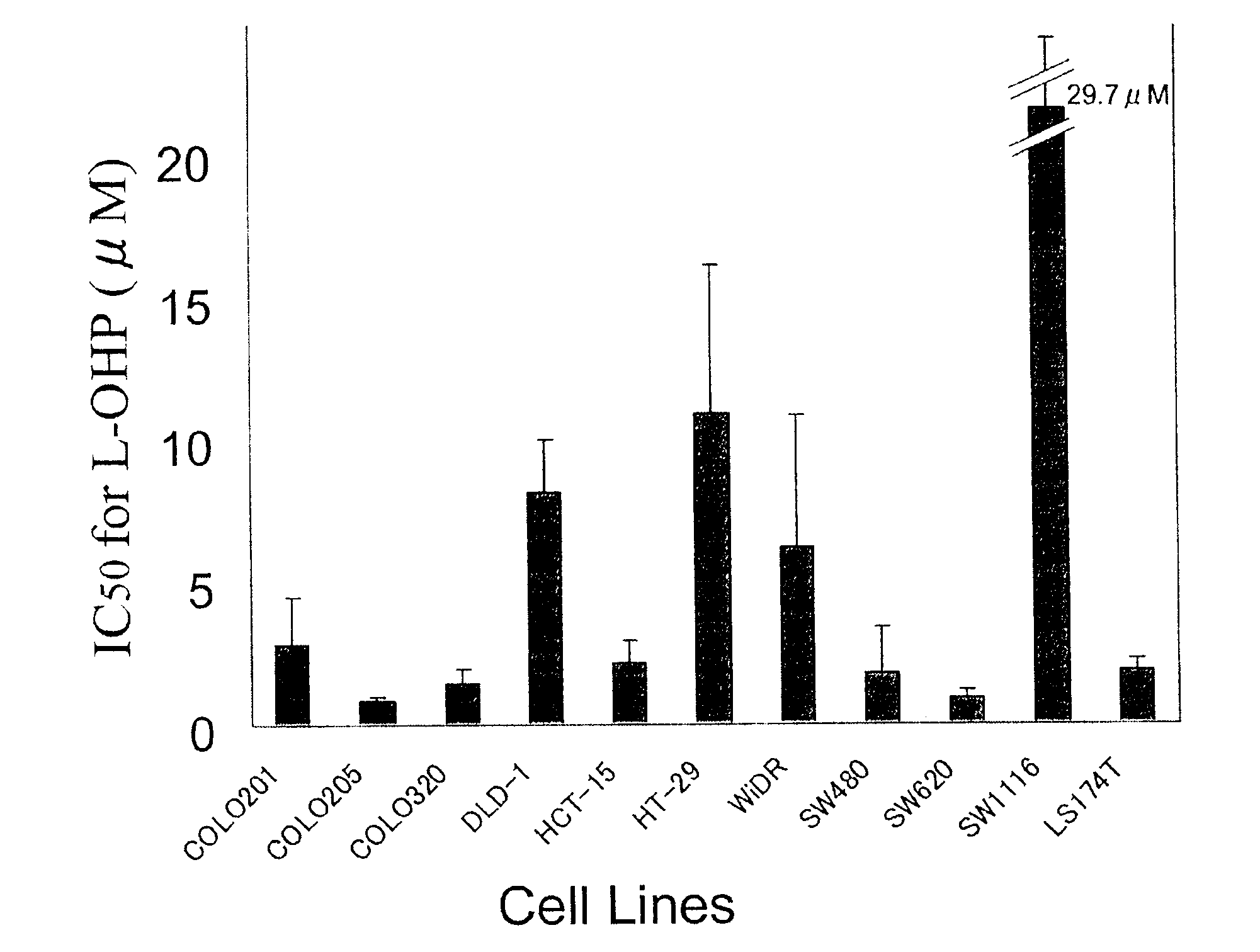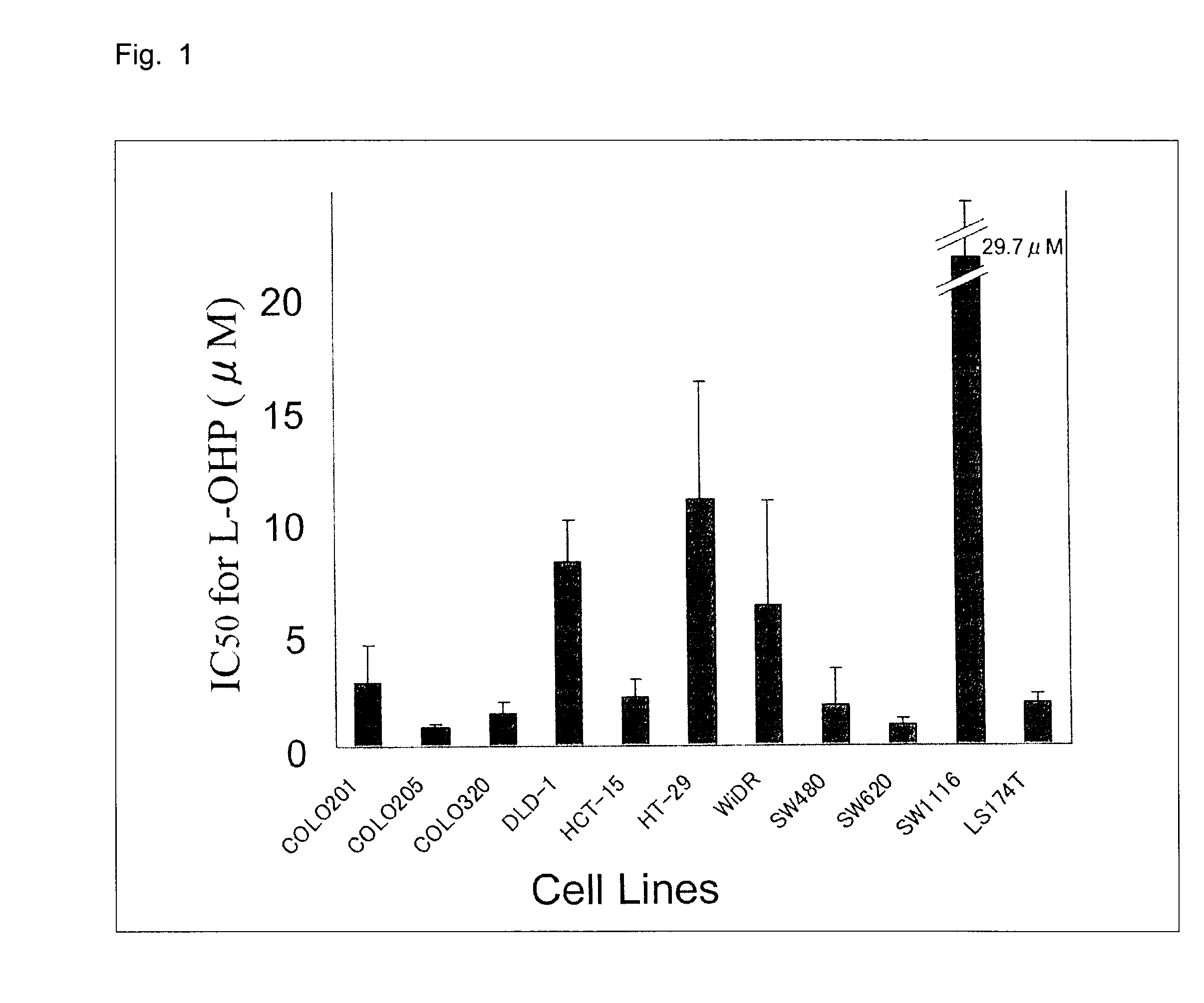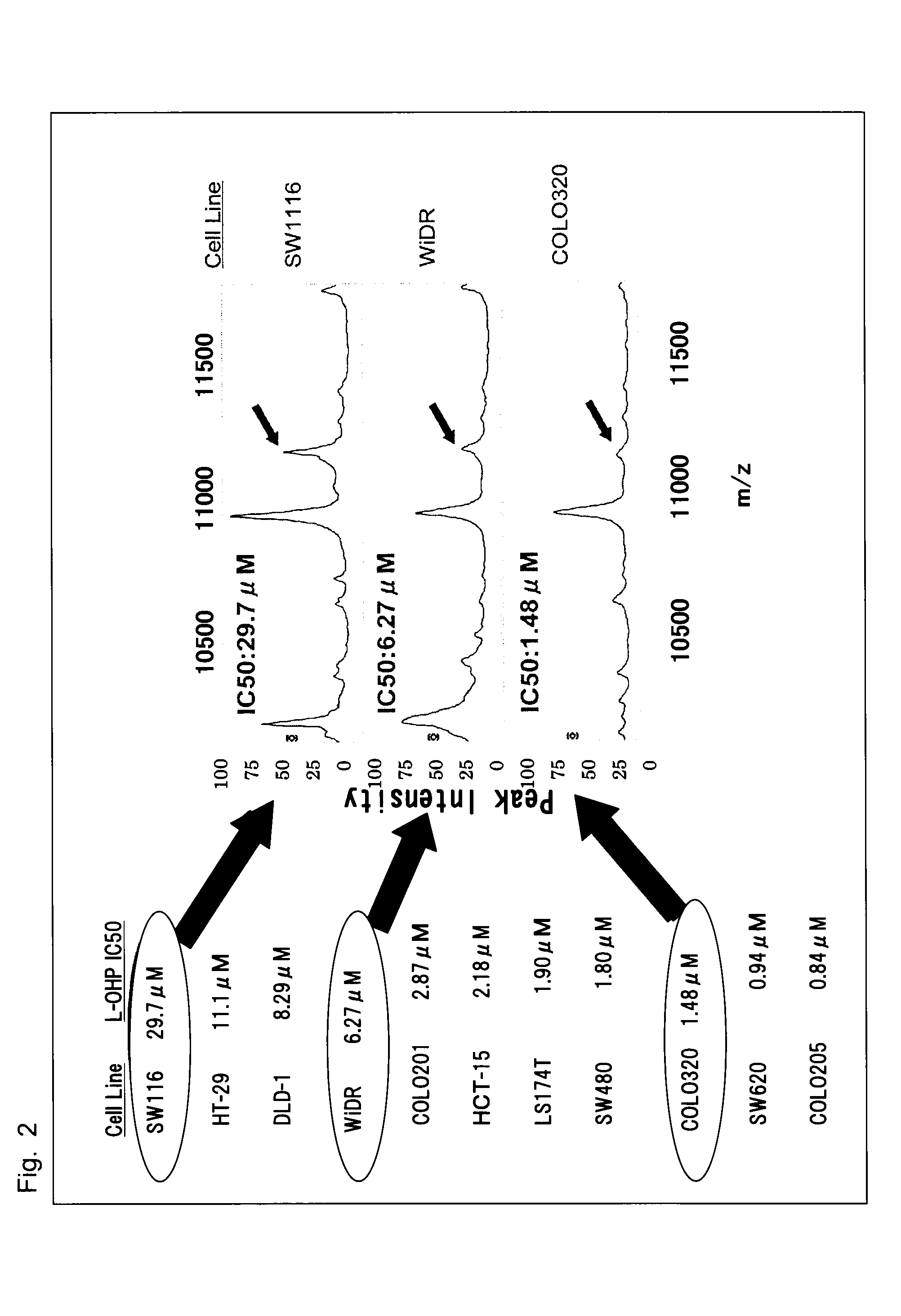Method for determination of sensitivity to Anti-cancer agent
a technology of anti-cancer agent and sensitivity, which is applied in the direction of drug composition, biological material analysis, peptides, etc., can solve the problems of long treatment schedule, difficult to continue therapy, and interindividual differences, so as to achieve high therapeutic effect, avoid unnecessary adverse events, and improve the effect of anti-cancer
- Summary
- Abstract
- Description
- Claims
- Application Information
AI Technical Summary
Benefits of technology
Problems solved by technology
Method used
Image
Examples
example 1
(1) Method
[0071](a) Cells Used
11 kinds of human colorectal cancer cell lines (COLO201, COLO205, COLO320, DLD-1, HCT-15, HT-29, LS174T, SW480, SW620, SW1116, and WiDR) were obtained from the following (Table 1).
[0072]The culture was performed in a φ100 mm / tissue culture dish (IWAKI) for adherent cells and a φ100 mm / non-treated dish (IWAKI) for suspension cells by using a medium (RPMI 1640, 2 mM glutamine, 10% fetal bovine serum) at 37° C. under 5% CO2.
TABLE 111 kinds of human colorectal cancer cell linesBank fromName ofwhich cellResourcecellline isDeposition organization (ornumber orLot number orlineobtainedmanufacturer)the likethe likeCOLO201JCRBHealth Science ResearchJCRB022611252003Resources Bank, Japan HealthSciences FoundationCOLO205TKGCell Resource Center forTKG0457I-4439Biomedical Research,Institute of Development,Aging and Cancer, TohokuUniversityCOLO320RCBRIKEN BioResource CenterRCB1193003DLD-1ECACC(Dainippon Sumitomo PharmaEC-9010254000 / J / 025Co., Ltd.)HCT-15TKGCell Resource...
example 2
(1) Method
[0090]As cells, 7 kinds of human colon cancer cell lines (DLD-1, HCT-15, HT-29, LS174T, SW480, SW620, and WiDR), and as a drug, cisplatin (cis-Diammineplatinum(II) dichrolide, SIGMA) were used. The cell survival rate after exposure to 0 to 1,000 μmol / L cisplatin for 48 hours was evaluated by MTS assay in the same manner as in Example 1 and the IC50 value was calculated. The extraction of the intracellular protein, the protein expression analysis, and the correlation analysis between the protein expression and the cisplatin (CDDP) sensitivity were performed in the same way as in Example 1.
(2) Results
[0091](a) Evaluation of Cisplatin Sensitivity in 7 Kinds of Human Colorectal Cancer Cell Lines
[0092]The IC50 value of each cell line was 3.33±0.80 to 26.9±11.6 μM and there was recognized a wide range in the sensitivity.
[0093](b) Correlation Analysis Between Protein Expression and Cisplatin Sensitivity
[0094]Through the correlation analysis and the linear regression analysis, the...
example 3
(1) Method
[0095]As cells, 5 kinds of human colorectal cancer cell lines (COLO320, HCT-15, HT-29, LS174T, HCT116 (HCT116 was obtained from ECACC)), and as a drug, an irinotecan active metabolite (SN-38, obtained from Yakult Honsha, Co., Ltd.) were used. The cell survival rate after exposure to 0 to 1,000 nmol / L SN-38 for 72 hours was evaluated by MTS assay in the same manner as in Example 1 and the IC50 value was calculated. The extraction of the intracellular protein and the sample preparation for ProteinChip analysis were performed in the same way as in Example 1. For the analysis, ProteinChip™ Reader (Model PCS4000 Personal Edition, Bio-Rad) was used, and the analysis was performed under the following conditions: mass range, 0 to 70,000 daltons; focus mass, 11,000 daltons; energy, 3,000 nJ; and 265 shots in total per sample. The protein expression analysis was performed by using CiphergenExpress™ Data Manager 3.0.
(2) Results
[0096](a) Evaluation of SN-38 Sensitivity in 5 Kinds of H...
PUM
| Property | Measurement | Unit |
|---|---|---|
| Concentration | aaaaa | aaaaa |
| Sensitivity | aaaaa | aaaaa |
Abstract
Description
Claims
Application Information
 Login to View More
Login to View More - R&D
- Intellectual Property
- Life Sciences
- Materials
- Tech Scout
- Unparalleled Data Quality
- Higher Quality Content
- 60% Fewer Hallucinations
Browse by: Latest US Patents, China's latest patents, Technical Efficacy Thesaurus, Application Domain, Technology Topic, Popular Technical Reports.
© 2025 PatSnap. All rights reserved.Legal|Privacy policy|Modern Slavery Act Transparency Statement|Sitemap|About US| Contact US: help@patsnap.com



